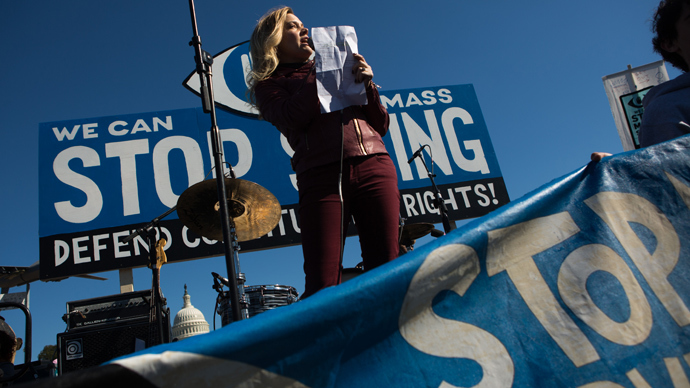Leaders in Israel — one of America’s closest allies—have for years been targeted in a surveillance operation waged by the United States’ National Security Agency, or NSA, according to files leaked by Edward Snowden.
Those documents reportedly also contain information suggesting that heads of international charities, foreign energy companies, United Nations officials and the vice president of the European Commission were targeted as well by either British or American spies.
The New York Times, the Guardian and Der Spiegel all reported on Friday that classified documents supplied to them by the former intelligence contractor contain details about, among other programs, a NSA operation that set its sights on the email account belonging to the office of an Israeli prime minister.
Ehud Olmert, the PM of Israel at the time of the January 2009 interception, was spied on by the NSA and British colleagues at the GCHQ, according to the latest reports that rely on intelligence supplied by Snowden.
But the revelations go further: journalists say this week that the documents show details pertaining to NSA operations in 60 countries, Times reporters James Glanz and Andrew Lehren wrote, including not just arguably one of America’s closest allies, but also individuals from the likes of the UN and EU.

The Times reported Friday morning that “Britain’s General Communications Headquarters, working closely with the National Security Agency, monitored the communications of senior European Union officials, foreign leaders including African heads of state and sometimes their family members, directors of United Nations and other relief programs and officials overseeing oil and finance ministries, according to the documents. “
“The latest disclosures will add to Washington's embarrassment following the heavy criticism of the NSA when it emerged that it had been tapping the mobile telephone of the German chancellor, Angela Merkel," James Ball and Nick Hopkins wrote for the Guardian.
Indeed, those operations have caused such a set-back for diplomatic relations that a report penned by a review group assembled by US President Barack Obama and released this week cautioned the NSA to nix those programs and others brought to light by files supplied to the media by Mr. Snowden.
Beginning June 6, a steady stream of leaked intelligence documents handed to reporters by Snowden have exposed classified operations that have caused heads of state and both the American public and political realms alike to demand reform.
The review group report, released Monday, offered 46 recommendations to the White House suggested by experts handpicked by Pres. Obama.
The US government, that committee wrote, should reaffirm that federal surveillance programs “be directed exclusively at the national security of the United States or our allies,” and “must not be directed at illicit or illegitimate ends, such as the theft of trade secrets or obtaining commercial gain for domestic industries.”
The NSA responded to media reports claiming it had spied on
Israeli government officials by saying that it is “not going
to comment publicly on every specific alleged intelligence
activity,” Haaretz newspaper reported.
NSA spokeswoman Bernadette Meehan reiterated that the US
“gathers foreign intelligence of the type gathered by all
nations."
Prior to this week’s leaked report, Mr. Snowden’s NSA files have shown US-operations that targeted the likes of Brazilian oil companies and Chancellor Merkel, who earlier this week told Der Spiegel that the Obama administration’s tactics are on par with those of the communistic, East Germany police force, the Stasi.
The latest documents, the Times reported, show new evidence of spy programs that have targeted German officials, as well as those in France, Israel and elsewhere. But while the US has long admitted to collecting signals intelligence pertaining to foreign governments, the latest documents show that several UN missions in Geneva were targeted by the NSA, including the United Nations Children’s Fund, or Unicef, and the United Nations Institute for Disarmament Research.
“It is unclear what the eavesdroppers gleaned,” Times journalists said. “The documents include a few fragmentary transcripts of conversations and messages, but otherwise contain only hints that further information was available elsewhere, possibly in a larger database.”
Joaquín Almunia, the vice president of the European Commission and a target listed in the leaked documents, told the Times he was “strongly upset” about the spying. His commission has authority over companies across the globe, the paper reported, and has previously fined US companies Google, Microsoft and Intel over antitrust matters.
The NSA denied allegations that these operations were done to benefit US businesses in a statement sent to the Times.
“We do not use our foreign intelligence capabilities to steal the trade secrets of foreign companies on behalf of — or give intelligence we collect to — US companies to enhance their international competitiveness or increase their bottom line,” NSA spokeswoman Vanee Vines wrote the paper.
Later, however, she added that national security concerns justify some accusations of spying.
“The intelligence community’s efforts to understand economic systems and policies, and monitor anomalous economic activities, are critical to providing policy makers with the information they need to make informed decisions that are in the best interest of our national security,” she said.

